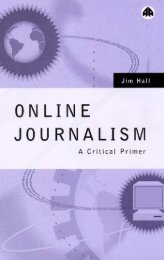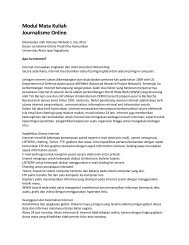1What is online journalism? - Ayo Menulis FISIP UAJY
1What is online journalism? - Ayo Menulis FISIP UAJY
1What is online journalism? - Ayo Menulis FISIP UAJY
Create successful ePaper yourself
Turn your PDF publications into a flip-book with our unique Google optimized e-Paper software.
The core journal<strong>is</strong>m 55<br />
and the interviewee. So one of the time-honoured techniques of<br />
the newspaper journal<strong>is</strong>t – the leading question – has to be<br />
d<strong>is</strong>carded.<br />
If a newspaper journal<strong>is</strong>t asks Mr X, ‘Would you say the Mayor<br />
has acted far beyond h<strong>is</strong> powers?’ and receives the answer ‘Yes’,<br />
the journal<strong>is</strong>t will then report, using indirect speech, that Mr X<br />
says the Mayor had acted far beyond h<strong>is</strong> powers. Th<strong>is</strong> <strong>is</strong> no good<br />
for an audio interview. The leading nature of the question<br />
becomes transparent. Also ‘Yes’ does not make a sparkling<br />
soundbite. Interviewees must express their views in their own<br />
words. Getting them to talk <strong>is</strong> important, but so <strong>is</strong> getting them to<br />
stop. And getting them to say something worthwhile.<br />
As a rule, people do not like having a microphone thrust in their<br />
face. It makes them nervous and they become either tongue-tied<br />
or they talk too much. Either situation requires the journal<strong>is</strong>t to<br />
take as much control of the interview as possible.<br />
But how to get that control? You cannot, and should not,<br />
attempt to make your interviewee say exactly what you want.<br />
However, you should ensure that the interview has structure,<br />
focus and flow. That way, the interviewee will have to address<br />
the key points but should also have the freedom to say<br />
something spontaneous, maybe even unexpected. You must also<br />
get a recording of reasonable technical quality, but th<strong>is</strong> <strong>is</strong> not<br />
rocket science.<br />
The ground rules for conducting interviews offered earlier in<br />
th<strong>is</strong> chapter, in particular the need for preparation, are vital to the<br />
success of audio interviews. But here are some additional<br />
guidelines.<br />
1 It seems obvious, but remember that people will be l<strong>is</strong>tening to<br />
the end product. So make sure your topic <strong>is</strong> suited to an audio<br />
interview. Very technical subjects, laden with factual information,<br />
do not usually make easy l<strong>is</strong>tening. Also choose an<br />
interviewee who <strong>is</strong> a good talker – someone who <strong>is</strong> fluent and<br />
a clear speaker.<br />
2 Be real<strong>is</strong>tic about how much you can cover. Unless you have a<br />
major interview or a very complex subject, limit yourself to<br />
key points. Th<strong>is</strong> will provide your outline structure.
















